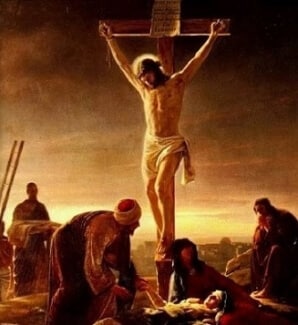
“You must share your toys with your brother,” Momma says to little Charles. “But they’re mine,” Charles whines back. “You must take a nap now,” orders Momma. “But I’m not tired,” responds little Charles. “My friends don’t have to take naps, why do I?”
Children live in a me-centered world. “Little Charles” does not realize that his siblings are as important as he is, and that Momma needs a break now and then. Little children are incapable of thinking about what’s good for other members of the family, and they assume that Momma’s sole person in life is to serve their every whim.
We are like little Charles. We live in a me-centered culture in which self-gratification reigns supreme. This extends even to our relationship with God. We figure that his job is to protect us, heal our wounds, and provide for our needs. Do we ever think that he’s much more important than we are? Do we ever ask what will please him even if it means self-sacrificing on our parts?
Today we return to the Last Supper room and listen to Jesus speak to his frightened, long-faced disciples. “But what’s going to happen to us when you leave?” they must have thought. Were they thinking about what was good for Jesus or what was good for themselves? (John 14:27-31).
“Jesus said to his disciples: ‘Peace I leave with you; my peace I give you. Not as the world gives do I give it to you. Do not let your hearts be troubled or afraid. You heard me tell you, I am going away and will come back to you. If you loved me, you would rejoice that I am going to the Father…’”
More than likely these disciples were not rejoicing at that moment. Why? Because they loved themselves more than they loved Jesus. Even though Peter vowed he would die for Jesus, deep inside he was still centered on Peter, not Jesus. Imagine how excited Jesus must have been to realize that he was about to “graduate” from this life and go back home to his Father. Though crucifixion and great suffering lay before him, he knew that within a day or so, he’d be back home, and his mission on earth would be finished. Were his disciples able to rejoice for Jesus’ sake or were they stuck in a “what about me” mode?
“And now I have told you this before it happens, so that when it happens you may believe.”
Jesus knew what was going on inside these disciples, and yet he spoke these words to them for a later time. After he died, they would reflect back on his words and realize why Jesus was telling them to rejoice. After receiving the gift of the Holy Spirit, they too would have a longing to go home to the Father and be ready to lay down their lives for Jesus. When the Holy Spirit began to live inside them, they had the power to choose God’s will over their me-centered wants and desires.
As Christians we have outgrown our “little Charles” stage. Filled with the Holy Spirit we learn to do what pleases God whether it satisfies our own whims and desires or not. We can rejoice because Jesus is home with the Father and that in a short time, he will come to take us home with himself. And what “big Charles” realized later in life is that Momma’s directions were, in the long run, best for his own happiness and character development.
Today we repent of our me-centered attitude and ask God to so fill us with the Holy Spirit that we are able to rejoice with Jesus rather than mourn our own unmet desires.
